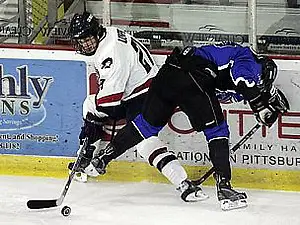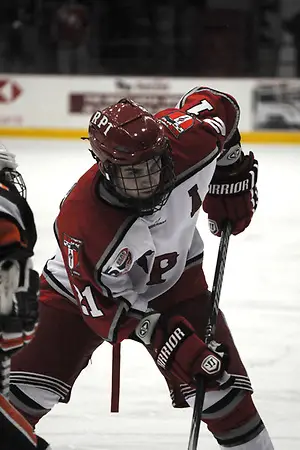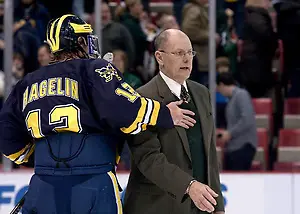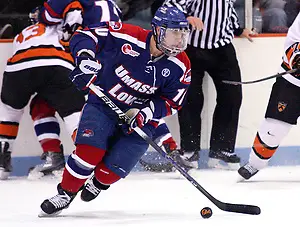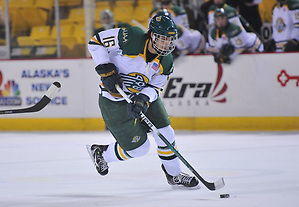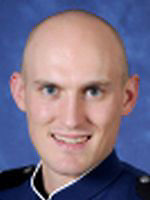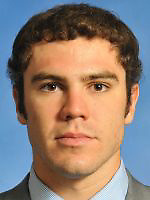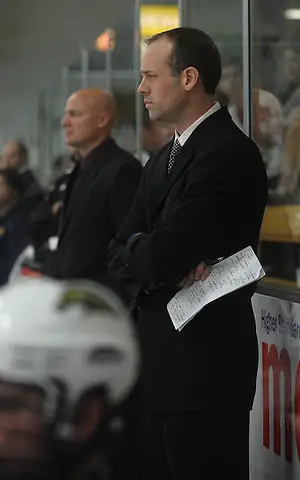While the regular season winds down, the D-III West region playoff picture gets clearer with every weekly coat of Windex in the form of pivotal games down the stretch. At stake in each of the three conferences is an automatic bid to the NCAA D-III tournament.
Here is a brief synopsis of how playoff and nonplayoff bound teams are faring in the respective Midwest Collegiate Hockey Association, Minnesota Intercollegiate Athletic Conference and Northern Collegiate Hockey Association.
MCHA
Dates: Feb. 25-27 quarterfinals; March 4-5 Harris Cup finals
Format: Top three teams in the Northern and Southern Divisions qualify for the postseason, where seeding is based on overall records opposed to conference performances. The overall top team is the No. 1 seed while the other division champion is the No. 2 seed. The No. 1 and 2 seeds receive a first-round bye. In the opening round, second and third-placed teams are paired off with the higher seed serving as host. The respective winners advance to the Harris Cup finals at Adrian College, where they meet the No. 1 and 2 seeds. As an added incentive, the Harris Cup champion hosts the 2012 MCHA finals.
Sure bet: No. 6 Adrian and No. 10 Milwaukee School of Engineering are deadlocked with identical 12-1-1 conference and 15-3-1 overall records in the Southern Division, which means the runner-up will be a No. 3 seed and has to play a quarterfinal game. The two MCHA powerhouses finish the regular season with a pivotal two-game series at MSOE on Feb. 18-19. Marian (14-5, 11-3) leads the Northern Division with a six-point advantage over second-place Lawrence.
On the cusp: Lawrence (9-9-1, 7-7), Northland (6-11-2, 5-7-2) and Lake Forest (4-14-1, 4-9-1) are pretty much locked into playoff spots and will be jockeying for a chance to host a quarterfinal game.
Outside looking in: At this point, it would pretty much take an act of God or Congress for Concordia (Wis.) (1-17-1, 1-12-1) and Finlandia (1-17, 1-13) to reach the playoffs.
MIAC
Dates: Feb. 25, first round, semifinals, Feb. 26; and March 2 Ed Saugestad Trophy championship final.
Format: First round features the No. 5 seed at No. 4 seed, with the winner playing the No. 1 seed in the semifinals. The No. 2 seed hosts the No. 3 seed in the other semi. The winners meet in the finals March 2, with the highest remaining seed serving as host.
Sure bet: No. 8 Hamline has taken stewardship of the MIAC by going unbeaten in its last 11 games (7-0-4). The Pipers have a three-point edge over surging Concordia (Minn.), which has landed in second by virtue of a five-game unbeaten streak (4-0-1). St. Thomas, which has seen its fortunes sway lately, will have to fend off Gustavus Adolphus for the No. 3 seed.
On the cusp: Bethel clings to the final playoff spot despite winning only once in its last four outings (1-2-1) while sixth-place St. Olaf (9-7-3, 3-4-3) has made a serious run by putting together a four-game winning streak, which included snatching a pair of victories over the Royals last weekend.
Outside looking in: Saint Mary’s (4-13-2, 3-5-2), St. John’s (4-14-1, 3-6-1) and Augsburg sit (8-8-3, 2-6-2) mired in the MIAC lower tier, but all three conceivably have a shot at the final playoff spot. St. John’s, which has won once in its last six games (1-4-1), has a home-and-home series with Hamline this weekend followed by a home tilt with Saint Mary’s (Feb. 12-13) and a home-and-home with St. Olaf (Feb. 18-19). The Cardinals have a home-and-home with Augburg this weekend, followed by a two-game series at St. John’s (Feb. 12-13), and a home-and-home set with Gustavus to close out the regular season. The Auggies, who have only one win in their last eight games (1-5-2), face a hefty climb with encounters with Saint Mary’s (Feb. 4-5), St. Olaf (Feb. 11-12), and Bethel (Feb. 18-19) ahead.
NCHA
Dates: Feb. 18-19, quarterfinals; Feb. 26, semifinals; and March 5, Peters Cup championship.
Format: All seven teams qualify, with teams seeded No. 1 through No. 7. The No. 1 seed gets a first-round bye while the opening round features No. 2 against No. 7, No. 3 versus No. 6 and No. 4 pitted against No. 5. The three winners advance to the semis, where No. 1 seed hosts the lowest remaining seed. The second highest remaining seed plays the third highest in the other semi. The semi winners meet in the championship game with the highest seed serving as host.
Sure bet: With two weeks left, No. 2 St. Nobert’s five-point lead over second-place Wisconsin-Superior sees the Green Knights (17-3-1, 11-2-1) nab top spot and the coveted No. 1 playoff seed. That leaves UW-Superior (12-8-1, 9-5), UW-Stout (12-9, 7-7) , UW-Eau Claire, (12-8-1, 6-7-1), UW-Stevens Point (10-11, 6-8) and UW-River Falls (9-11-1, 5-9) to battle for the No. 2 through No. 4 seeds to earn home advantage in the opening playoff round.
On the cusp: St. Scholastica (9-11-1, 4-10) will have to maximize points during the final two weeks to reach fourth place and a chance to host a quarterfinal game. That will be no easy feat, as they are away to UW-Stevens Point and St. Norbert on Friday and Saturday respectively. The Saints host UW-Superior Feb. 10 and travel to UW-Eau Claire Feb. 11 to close out the regular campaign.
Outside looking in: Due to the NCHA’s all-inclusive playoff setup, no one.
Players of the Week
MCHA: Eric Miller, Adrian. The senior left wing netted five goals, including a hat trick Saturday, in the No. 6 Bulldogs’ weekend sweep over visiting Finlandia last weekend. The Erlanger, Ky., native notched the game-winner in his team’s comprehensive 9-2 victory Saturday and moved into second place in team scoring with 12 goals and 15 assists for 27 points.
MIAC: Charlie Raskob, St. Olaf. The junior center’s six-point weekend propelled the Oles past Bethel, 4-2 and 7-2, and put the team in contention for a playoff spot. The Hastings, Minn. (Holy Angels) product assisted on three of the Oles’ four goals, including Isak Tranvik’s game-winner in the third period in Friday’s victory. In Saturday’s contest, he scored twice and assisted on Britton Smith’s game-winner. Raskob’s 16 points on six goals and 10 assists leads the team.
NCHA: Scott Lewan, Wisconsin-River Falls. The freshman netminder’s two yeoman performances were critical in the Falcons’ victories over UW-Superior, 1-0, and St. Scholastica, 5-3, during the weekend. The Westland, Mich., native turned away 32 shots in garnering his second career shutout on Friday. He made 28 saves to preserve the team’s victory over St. Scholastica on Saturday. This season, Lewan is 6-8-1 with a 2.30 goals-against and a sterling .932 save-percentage.
 USCHO.com’s Jim Connelly and Ed Trefzger are joined by Robert Morris coach Derek Schooley as they look at four Hobey Baker candidates from Atlantic Hockey: Robert Morris forward Nathan Longpre, Niagara forwards Brian Haczyk and Paul Zanette, and Rochester Institute of Technology goaltender Shane Madolora.
USCHO.com’s Jim Connelly and Ed Trefzger are joined by Robert Morris coach Derek Schooley as they look at four Hobey Baker candidates from Atlantic Hockey: Robert Morris forward Nathan Longpre, Niagara forwards Brian Haczyk and Paul Zanette, and Rochester Institute of Technology goaltender Shane Madolora.